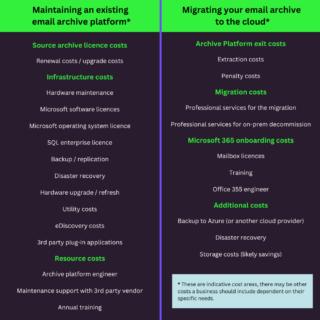Cut business costs by migrating your email archive now

With challenging economic conditions, it’s understandable that some businesses are considering their spending until they have a more certain future. However, when it comes to spending on IT projects, such as migrating an email archive to the cloud, pausing may not be the best strategy.
In this blog we explore your options around an email archive migration and the potential cost implications of each of these options.
Businesses are facing increasing financial pressures across the globe, forcing many to review their priorities and drive the best value from any investment. With stories of challenging economic conditions, it’s understandable that some businesses are considering their spending until they have a more certain future. However, when it comes to spending on IT projects, such as migrating an email archive to the cloud, pausing may not be the best strategy. In this blog we explore your options around an email archive migration and the potential cost implications of each of these options.
The financial implications of each email archive option
Over our 17 years of helping businesses with their email archive migrations, we typically come across three options that businesses consider for their email archive:
1. Migrate to the cloud now with a specialist migration partner
2. Leave the archive in place
3. Perform the email archive migration themselves.
A major factor in evaluating these options is the cost to the business of each. In our experience, it’s more cost effective to migrate to a new cloud environment, but then we would say that. Before making the final decision, we wanted to outline the types of costs you should consider for each scenario.
1. Costs of migrating to the cloud now with a specialist migration partner
In our experience, migrating email archives to a cloud platform such as Microsoft 365, is typically the most cost-effective route for many businesses. Email archive migration projects often involve moving terabytes of data and this will of course come with costs. So, for transparency, here is an overview of the common costs involved in an email archive migration:
- Extraction from previous archive– If you currently use a third-party provider for your on-premises email archive, there is almost certainly a cost to extract that data in bulk. Potentially you can do this in smaller sections using free tools, but this is rarely viable for an entire email archive migration. Chances are, we’re talking tens or hundreds of millions of emails. We recommend you check your contracts for lock-in clauses and then come and talk to us before making your final decision.
- Renewal cycles & penalty charges– You may have received a discount for signing up to your archiving software for longer than a 12-month period. If you want to move before the end of this period, you may be looking at a penalty charge. Sometimes you could be charged for an entire year.
- Migration costs– There are costs involved in a secure migration of your archive data – this should cover access to market-leading migration software, a fully managed service and access to experienced professionals. Transvault focus on a premium outcome for your migration – Get a quote to find out more on our fees.
- Onboarding costs– there are costs associated with onboarding to Microsoft 365 as well as ongoing training, productivity improvements and adoption to ensure you maximise your return on investment
Managing your migration costs
You can reduce the costs of migrating your email archive by following a structured migration plan. As part of this plan, understanding what data you have and deciding which data to migrate can have a real impact on the final cost of the migration. For example, there may be some data that doesn’t need to be migrated if it’s of a certain age and outside of a retention policy. Choosing not to migrate this data could reduce the cost of the overall migration. You may also choose to split the migration into multiple sequenced projects to spread out the cost of the project if cash flow is a consideration.
Read our data migration planning guide for more information.
It’s also important to remember that migrating your email archive to the cloud will save you significant costs.
- You’ll no longer need to maintain a separate email archive solution. This will save license costs, as well as the infrastructure and resources costs of maintaining the archive as outlined above.
- In practical terms, centralising your data in the cloud will reduce the cost of data administration.
- With the cloud, everything is on-demand and with SaaS you only pay for what you use. No more huge server purchases to worry about, especially when they aren’t necessarily the right size for your requirements.

2. Costs of leaving the archive in place
For businesses where cost is one of the key deciding factors, leaving the email archive data to ‘age-off’ in an existing platform often looks attractive. However, once you consider all the potential costs involved, this is often not the case. If you are considering this route here are some key cost related questions you should ask:
- What are the ongoing licensing costs for retaining your legacy archive platform? Don’t be seduced by any short-term deals, work out what your business needs for the next three years as a minimum.
- How will these licensing costs increase as the volume of data you store increases? Remember, if you leave your email archives in a legacy archiving platform for say three years, you’ll continue to generate new data to store in the platform over this time. How will this increase your licensing costs?
- What resource do you need to manage the legacy archive platform? Maintaining a legacy archive platform will require the allocation of specific people to manage the platform. What are the costs for this resource and how much will it cost to keep this resource sufficiently skilled in the platform to enable effective management?
- What infrastructure do you need to retain to support the archive platform and how much will this cost? Particularly if you are maintaining an on-premise archive platform, there will be significant associated data-centre / server costs, utility costs etc for running this hardware.

3. Cost of performing an email archive migration yourself
We see many customers consider attempting the migration themselves. This usually happens when they cannot easily see the value of investing in specialist support. Without solid experience of migrating this kind of data, we know that this often results in the wrong outcome, and ultimately, it’s often more costly in the long run. Our recent blog ‘In-house email archive migrations – are they ever the best option?’ explains in detail the challenges of doing a migration yourself.
Other financial implications when considering an email archive migration
If you do decide to progress with an email archive migration using a specialist partner, there are other financial considerations to bear in mind.
- There are differing migration pricing models adopted by vendors. At Transvault, we favour the fully managed, fixed price, fixed outcome model over a more pay-as-you-go approach to your archive migration. This is a tried and tested pricing model that gives a commitment to the customer of a successful migration outcome for a set price.
- The challenge of on-prem vs cloud is that on-prem typically requires an upfront investment and so follows a CAPEX model. Cloud systems on the other hand are often subscription based and follow an OPEX model. As you consider all the costs involved in a migration to the cloud, you’ll need to express your CAPEX spend in a way that allows you to compare it to the OPEX model to be able to make an informed decision.

Other benefits of migrating your email archive now
In the current economic climate, cost is a key consideration for all businesses thinking about migrating to the cloud. There are, however, a number of other advantages to making the move sooner rather than later.
Here’s a summary of those benefits, you may also want to take a look at our blog ‘Why Moving Email Archives To The Cloud Is Important’ for a more detailed discussion.
Technical advantages
- Benefit from the latest updates and cloud technology.
- Reduces the number of systems you need to manage.
- Constantly adapt to new security threats.
Operational benefits
- Quicker and simpler eDiscovery
- Email data all in one place.
- Access anywhere capability.
Risk Management
- Enhanced business resilience
- Improved security
- Remaining compliant
- Addressing the risk of PST files
How Transvault can help you now with your migration
Transvault has been helping organisations around the world to migrate their email archives for over 17 years. Having completed over 3000 projects, migrating 33PB of data, we’re 100% focused on delivering the right outcome for your business. That’s why we carefully plan all our migrations and use a tried and tested commercial model that works for our clients. Find out more about why we’re best placed to help you with your migration and contact us today if you would like to discuss your migration project.
Find out more about the costs of a migration!